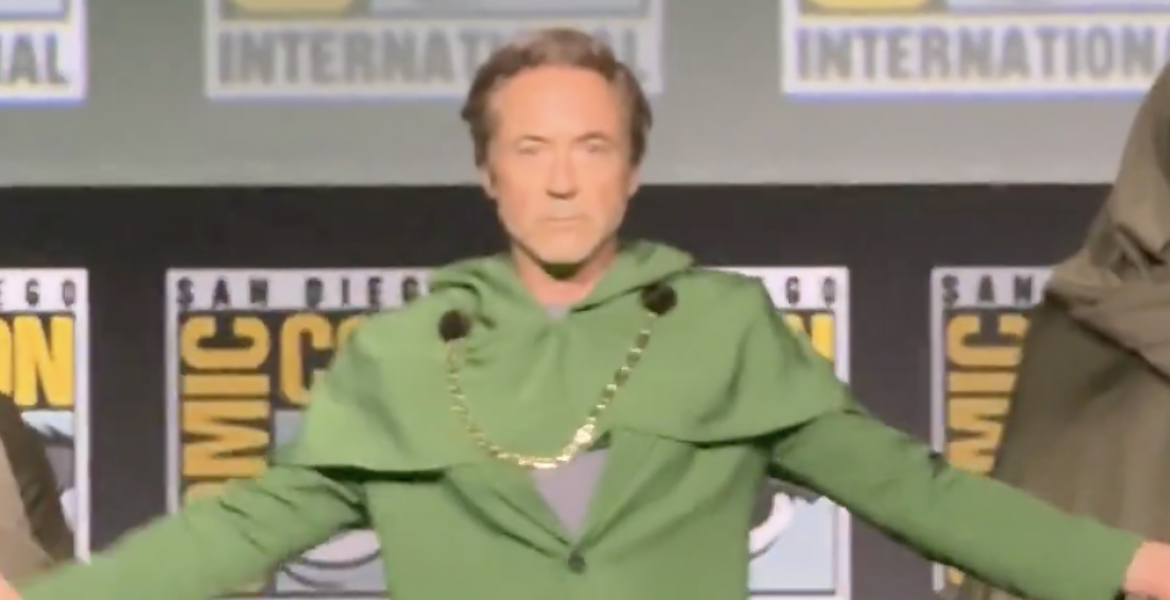Songwriter Radney Foster summed up the challenge of being a musician today with one word: “Spotify.”
“If I wrote a hit song and it gets played 1,000 times on Spotify, I make 4 cents,” he said. “The music revenue model is in trouble. A lot of trouble,” he said.
As an example, Foster referenced “All About That Bass” by Meghan Trainor. It received 268 million spins on Spotify. The song was co-written by her and a Nashville songwriter. The Nashville co-writer owns his own publishing company, so he gets half of all of the Spotify royalties.
“After 268 million spins, he got just $3,700,” Foster said.
With 268 million spins, half the fans of contemporary hits music in America must have played the song twice, negating their need to buy a CD or a song download that, unlike streaming music provides, offer songwriters higher royalty payments through vendors like iTunes.
The $3,700 song:
Meghan Trainor - All About That Bass (Official Video)
In comparison, Foster said that when terrestrial radio station plays a song, songwriters make more money per spin, depending upon the radio station’s audience size. Each listener is an “impression.”
“Can you imagine how many times a DFW radio station with 100,000 listeners would have to spin ‘All About That Bass’ to be heard 268 million times?” he asked.
Despite these challenges, singer and songwriter Radney Foster, 56, continues to influence American music, even though his mark is clearly visible and stretches across a 36-year career in music that started in Del Rio, Texas.
Foster’s greatest contributions are the songs he has written and co-written. They are recorded far and wide, and locals probably heard one a time or two, or own the records.
At the start of his career in the early 1980s, Foster teamed with Bill Lloyd. The male duo co-wrote the hit song “Since I Found You” that was recorded by the popular female duo Sweethearts of the Rodeo in 1985. Here are the Sweethearts performing the song on Austin City Limits in 1986.
More hit songs followed, and Foster became a star in Nashville early on. Foster’s Del Rio, TX 1959 record, named for his birthplace and year, produced two consecutive Billboard Top 10 hits, “Just Call Me Lonesome” and “Nobody Wins.” The latter, that featured Mary Chapin Carpenter with background vocals, peaked at #2 on the Billboard charts in 1993.
Here is Foster performing “Nobody Wins” at the Grand Ole Opry in 2007:
Sweethearts of the Rodeo - Since I Found You
Other songs Foster wrote or co-wrote that readers may have heard include “Raining on Sunday” and “I’m in,” both recorded by Keith Urban. Sara Evans recorded the Foster song, “A Real Fine Place to Start.”
Foster produced Randy Rogers’ first two records. On Rogers’ 2005 debut, Rogers and Foster co-wrote “Tonight’s Not the Night.” On a later record, the Texas music band recorded the Top 40 hit “Kiss Me in the Dark,” co-written by Foster with George Ducas.
Nonetheless, life as a musician in the Spotify era is not easy.
“You have to really love what you do,” Foster said more than once.
For Foster, megastardom never came. After each successful chapter in his career, there was always a setback, or lull, that was usually caused by forces outside his control. When Foster’s follow-on record to Del Rio, TX 1959 failed to chart a single within the Billboard Top 40, his record label Arista delayed the album release. When the record labels crashed, Foster started his own, Devil’s River Records.
His entrepreneurial pursuits in the music industry suit Foster just fine, where he can float between recording artist, performer, songwriter and producer.
The music scene pre-internet was where Foster learned his craft. Now, he said, the road to riches isn’t paved with platinum record sales because no one buys albums or CDs. With the high availability of streaming music, making money with paid music downloads, like iTunes, is almost impossible.
[[{"fid":"20691","view_mode":"preview","type":"media","attributes":{"alt":"Radney Foster holds the CD of his latest record, \\\"Everything I Should Have Said\t\\\" released in 2014. California is on this record. (Facebook)","title":"Radney Foster holds the CD of his latest record, \\\"Everything I Should Have Said\t\\\" released in 2014. California is on this record. (Facebook)","height":"675","width":"1200","class":"media-element file-preview imgbody"}}]]
Above: Radney Foster holds the CD of his latest record, Everything I Should Have Said released in 2014. "California" is on this record. (Facebook)
Keith Urban and Radney Foster - Raining On Sunday (Music Video)
Yet, there are still reasons to be a songwriter because, through song, he can touch and move people, Foster explained. When that happens, the money will come.
To be a successful songwriter, it requires discipline. Foster sketched out his routine. Every day, he schedules a set time to write songs.
“I can start with a groove or a beat, or strum it all out on my guitar, or just sit and write prose,” he said. The task of songwriting is strictly scheduled, whether it’s to write solo or with another person, usually a recording artist, he said.
Foster said he has written 50 songs a year for over 30 years.
Inspiration comes from life, he said. On Foster’s latest record, Everything I Should Have Said, the single “California” is a web of nostalgic memories (or history) and metaphors, sprinkled over a love song storyline. The inspiration came from driving to California with his wife. In the song, a man and woman, both divorced, meet along the way to California. Both were seeking new beginnings, just how California inspired songwriter Woody Guthrie (as Foster’s song reminds us) to “ride the rails” to escape the Great Depression by traveling to California from Oklahoma in the Dust Bowl. Or, how the state attracted Marilyn Monroe or the ‘49ers of the pre-Civil War Great Gold Rush.
The official lyric video of “California”:
RADNEY FOSTER California [Official Lyric Video]
“You have to give something compelling to the listener,” Foster said. What compels the listener may be 85 percent snappy music with clever lyrics that encourages one to dance, he said. A songwriter can get lucky once with that formula if he or she has the right music with the right lyrics performed by the right band, he said.
“But if you’re going to stay in the business, you better write more than just that,” he warned. “You’ve got to get down to the meat and the heart of the matter on the subject of life.”
Foster said that he doesn’t consider reaching for commercial success or following the most current popular formula from the music industry to write or produce a good song. He is one layer deeper, into the art of it all.
“I want someone to hear my song, pull their car over, call someone they love, and tell that loved one to download that song over the Internet,” he said. “That’s because they’ll want to listen to that song ten times over.”
“What is compelling?” is the first question he considers before writing. Foster said, “I want the listener to ask, ‘How did this guy (Foster) get inside my living room?’”
Another rule by which Foster measures his craft is to ask himself, “How will my song stand the test of time?”
“Of all the songs that have been in the Top 10 this year, only a handful will be remembered 20 or 30 years from now,” he said.
Thirty years ago, the Nitty Gritty Dirt Band recorded a timeless classic. Written by Wendy Waldman and Jim Photoglo, “Fishing in the Dark” has all the ingredients of a compelling song, according to Foster.
“It’s easy and it’s simple. But it’s as cool as all get out. Everything about it: the record, the song, the subject matter, the way they put it together, the cleverness of it, the melody, and everything about it… They’re still playing that dang thing on the radio,” Foster said.
Nitty Gritty Dirt Band’s 1987 performance of “Fishing in the Dark.” It has 4.7 million views on YouTube.com. YouTube was founded in 2005.
Nitty Gritty Dirt Band - Fishin' in the dark
When Foster mentors younger songwriters, he encourages them to study and dissect the work of songwriters who had many of their songs recorded by many people. His examples of who to study include Harlan Howard and Jimmy Webb.
Webb wrote many of Glen Campbell’s hits, like “Galveston.”
One of the struggles a new songwriter has is being too specific in his or her lyrics. Cleverness comes when specificity is clouded by a twist, or a turn, into something more abstract.
Foster uses “Galveston” as an example.
“On your first listen to it, you never would think it was about a guy overseas during war. ‘I clean my gun, and dream of Galveston’ is the only reference to the fact that the guy is overseas, away from the beach and his girl,” Foster said.
Glen Campbell performs Jimmy Webb’s “Galveston”:
Glen Campbell and Jimmy Webb: In Session - Galveston (with lead-in discussion)
By studying timeless hits from the days of Tin Pan Alley in the 1930s, up through each decade until today, listeners will discover there are forms of songs with noticeable formulas that define the established method of that timeframe. In each era, a new type of song breaks the mold, beginning a whole new formula of songwriting, Foster said.
“These are songs that just break the rules, but they do it so compellingly that you can’t resist it,” Foster said. “They’re just so far out there.”
As a rule-breaker, Foster names “Whiskey Lullaby” recorded by Brad Paisley and Alison Kraus.
“It breaks all of the rules. It’s four-and-a-half minutes long. It’s too long. Both of the subjects in the song drink themselves to death,” he said. Foster, who knows the songwriters, said they bragged that no one was going to record the song because it was so long and too dreary.
“Well they were wrong! Brad Paisley made a career out of it,” Foster said. “The reason is that the song and the melody are stunningly compelling.”
Brad Paisley and Alison Kraus sing “Whiskey Lullaby” in the official video:
Brad Paisley Alison Krauss Whiskey Lullaby Live
On Foster’s watch list of where the “next really big thing” will come are The Avett Brothers, The Old Crow Medicine Show, and “Sturgill Simpson is brilliant.”
Texas music star William Clark Green is another new artist to watch, Foster said.
What they are doing right, Foster said, “Is they’re writing from an artistic passion. But then it gets so big, they bust out into the pop or country music scene.”
Foster is working with a young fiddle player named Alisa McCance. She’s from the bluegrass music scene in Kentucky, but is currently in Nashville working as a studio musician. That’s how Foster discovered her talent.
Foster sees her base in the Americana music scene, a broader category where Texas country music resides.
“She’s very traditional in sound with a bluegrass flavor. I think she’ll reach a very broad audience,” Foster said.
Foster will produce McCance’s first record.
Foster, who splits his time living between Nashville and San Antonio, has a heavy tour schedule—about 80 shows a year now. Live performances are one of the few pure moneymaking jobs a songwriter can do in the Internet streaming era.
“Mailbox money from royalties isn’t what it used to be,” he said.
Foster was in San Angelo in April performing an acoustic show at the House of Fifi Du Bois and a headliner at the Larry Joe Taylor Music Fest in Stephenville.
At the beginning of the year, Foster contracted strep throat and couldn’t sing. Instead of putting his songwriting on hold, Foster penned prose from the bed as he recuperated.
“This is the first time I was forced to write the lyrics before singing a melody,” he said.
The exercise stretched his talents by reversing his workflow, and Foster said he discovered new and interesting ways to express his art. He’s putting the songs to melody now and expects to record his next record later this year.
You can sample Radney Foster’s work on Amazon or iTunes and follow him on Facebook and Twitter.

Subscribe to the LIVE! Daily
Required






Post a comment to this article here: